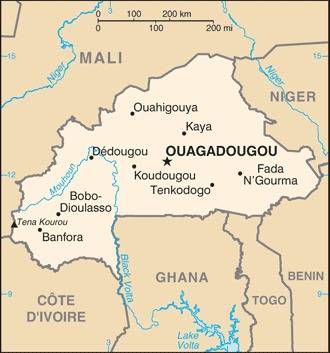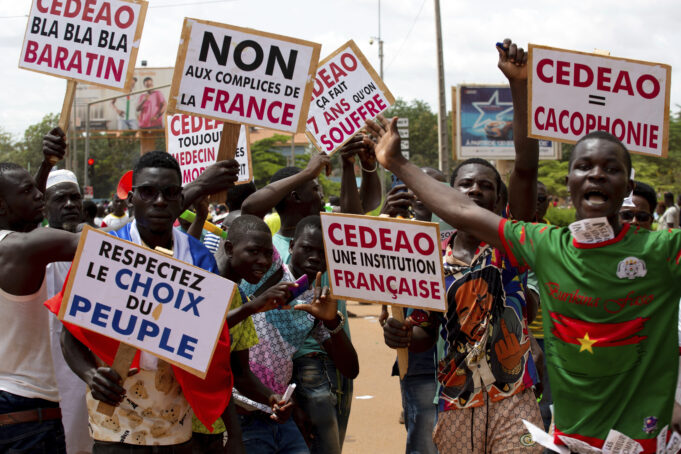The West African nation of Burkina Faso placed its former colonial master France on notice to remove their military from its soil. The move coincides with an uptick of anti-France and anti-West sentiment on the continent and among people in the landlocked country. French troops were in Burkina Faso under a 2018 security agreement that allowed French Special Forces to fight insurgents reportedly linked to ISIS and al-Qaeda terror groups that spread into the country since 2015. The groups control large swathes of northern Burkina Faso.
In late 2022 protests, the Burkinabe people demanded French special forces leave. They decried the forces were ineffective and cited heightened mayhem by the extremists. The Burkinabe government announced Jan. 21, the eviction was signed, sealed, and delivered, replete with a 30-day notice.
“The vision of the transition is that it is the Burkinabe themselves who must make the sacrifice for the liberation of the territory. We have faith that the commitment of the Burkinabe will be decisive,” said government spokesperson Jean-Emmanuel Ouedraogo, speaking Jan. 23 on national television.
“What we are denouncing today is the agreement that allows French forces in Burkina Faso. It is not about the end of diplomatic relations between Burkina Faso and France,” he said.
The spokesman added what the government currently desires most from friends is support in the form of military equipment. France maintains 400 troops in Burkina Faso in a deployment labeled “Sabre,” which is part of a wider military presence to fight extremists across the Sahel region. The Sahel is a strip of semi-arid land that stretches across the continent from East to West. It includes parts of Chad, Niger, Mali, Burkina Faso and Mauritania.
Although the military pact was inked in 2018, French forces had been in Burkina Faso since 2010. The current battle against extremists is spill-over since 2015 from bordering Mali, struggling the same crisis. Both countries suffered humanitarian disasters as a result. Thousands succumbed and nearly two million people in Burkina Faso were displaced. The United Nations says nearly one million people are living in blockades, where abductions and killings afflict the areas.
French and Burkinabe relations rapidly decline
Frustration intensified within the Burkinabe military over the failure to suppress the insurgency that fueled two coup d’états last year. Anti-France and anti-West sentiment also grew over the situation. The second coup in September 2022 swept in the current transitional president, Captain Ibrahim Traore, whose government declared the French ambassador persona non grata in early January. Paired with booting the French military gives an appearance of a shift in the old relationship between the subjugator and subjugated in Africa. Some analysts say that is all good but stay on alert.

“Yeah, it’s great, put the French military out; anybody that’s going to put the French military out of anywhere, that’s a good thing,” said Rafiki Morrison, an organizer with the All-African People’s Revolutionary Party.
But Mr. Morrison sees the moves as a problematic pivot away from the French towards the Americans, which maintains a large military presence through its African command-AFRICOM, under the pretext of fighting terrorism. America provides intelligence to France in a partnership that bonded during the 2011 NATO-North Atlantic Treaty Organization-induced invasion, overthrow, and assassination of Libyan leader Muammar Gadhafi. The elimination of Mr. Gadhafi, who contained the extremist elements and weapons flow across Africa, opened the cage to the current instability across the Sahel.
“I have not seen any weakening of relationships with AFRICOM in either Mali or Burkina Faso,” Mr. Morrison told The Final Call. He noted both countries signed partnership agreements that they agreed to honor.
If African countries are not extricating all foreign imperialist forces and severing their ties in terms of training, equipment, and intelligence arrangements with the U.S. military superstructure: “It’s a kind of out of the frying pan, into the fire type thing,” stated Mr. Morrison.
Mr. Morrison raised another concern which was the announcement by French President Emmanuel Macron about exiting Mali last year. Although the French left, they redeployed in neighboring nations.
As far as the continent is concerned, this meant they went nowhere.
Mitigating the turmoil in Africa comes amid a time of great power competition for influence and wealth including China, and powers like England, Russia, France and America that have had power and authority over the darker nations. Their rise to wealth and power came from the exploitation of Africa and other Global South regions. After the decolonization struggles of Africa, France kept its tentacles on its former colonies.
Will other African nations stand?
Wilmer Leon, political scientist and host of “Inside the Issues” on SiriusXM Satellite radio Urban View 126, says he believes more African nations will repulse exploitative powers and continue to develop relations with others. He said it’s the changing dynamics of the world.
“This is another example of an anti-imperialist, anti-Neo colonialist move, not only on behalf of African countries but countries in the Global South as well,” said Mr. Leon.
“As China has expanded its influence on the continent … Russia is expanding its influence … through cooperative measures, as opposed to imperialist or colonialist measures,” he said.
Countries find it a better business arrangement for them to do business with China, Russia, and Iran than it is to continue to be “abused and taken advantage” of by former imperialist powers.
Mr. Leon said Mali dismissing the French and hiring the Wagner Group, the private Russian mercenary firm to fight insurgents or South Africa holding joint military exercises with China and Russia at the end of February, are examples.
He was referring to the naval exercises called “Mosi”—which means “smoke” in the local Tswana language—being held between February 17 and 27, off the port city of Durban and Richards Bay, one of the strategically important shipping routes connecting Europe and Asia announced by South Africa on Jan. 22.
“The United States doesn’t like that at all. But here’s the problem. What is the United States offering? Other than coup de’ tats and continued oppression,” asked Mr. Leon. “China comes to Burkina Faso and restructures debt,” he said.
China’s Belt and Road Initiative means greater economic opportunity and employment. The U.S. is offering military conflict. “Most countries are siding or erring on the side of economic development and less military conflict,” added Mr. Leon.
The international dynamic is shifting, the problem is the former colonial powers don’t know how to deal with the change. “Because they only know one way to operate and that’s oppression,” Mr. Leon said.
A day of reckoning for White world rule
The pushback by Burkina Faso and African counterparts like Mali against the former colonizer can be understood in the ebb and flow of foreign affairs. However, the geopolitical drama unfolding now comes amid a decline of White world rule and a universal cry for justice and self-determination. All at crossroads and a “day of decision” concerning their futures.
The Honorable Minister Louis Farrakhan and his teacher the Most Honorable Elijah Muhammad of the Nation of Islam have cautioned world powers concerning a day of reckoning for global pilfering and a time every nation will return to its own.
Minister Farrakhan has said America needs access to the mineral resources in Africa to be a viable power in the 21st century. His words are being played out in the current scramble of powers including France, Russia, and China in Africa.
In his seminal book, “The Fall of America,” the Most Honorable Elijah Muhammad wrote that with the end of the rule of the White race over the Black people of Earth in sight—face to face—we have to deal with each other according to the actual facts which exist between the two nations (Black and White).
“With the nature and desire of the White race to continue their rule and subjection of the darker people even though the White man recognizes these facts, he will continue to try holding onto his rule; his subjection; his thinking of what he has acquired under such rule,” wrote Mr. Muhammad.
The powers refuse to give up the merchandise which they stole from real owners.
“He is willing to shed the blood of his own people and that of others to hold onto that which he calls his legal possessions,” said Elijah Muhammad. He explained further in his writings that a spirit is aroused in the Black man to say, “No!”—that the continent and what is on and under its surface belongs to Him and His people (Black nation).
“This is nothing but justice; that we have possession of what is our own,” wrote Elijah Muhammad.
“The White man is conscious of the fact that he deceived the Black man of the knowledge of the Black man and his possessions. But that particular authority was given divinely; temporarily. But, by the same Divinity, it is now being taken from the White race,” he said.













